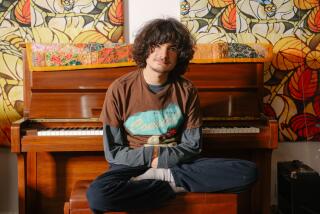At Age 9, Junior High Is Next, Harvard Later
- Share via
Joseph Noor has Harvard on his mind and a chemistry textbook in his hands -- and he hasn’t even finished elementary school.
The precocious 9-year-old from Fullerton will be heading to junior high school in the fall, having made it through sixth grade and establishing himself as an academic star among his classmates.
Although he will be nearly three years younger than his classmates at the beginning of the school year, he has no doubts about his prospects at Ladera Vista Junior High School in Fullerton.
“I’m just happy that I’m going,” he said.
He began reading at 2 1/2, and by 3 was enrolled in kindergarten. At 6, when most boys tussle over toy cars and soccer balls, Joseph was discussing Beethoven’s symphonies with adults. Now, he says, he reads two or three books a week, solves complex mathematical problems and is learning Arabic, his Lebanese father’s native language.
M.J. Noor said she realized her son was different early on. By the time he was 4, she was talking to him one day when he suddenly said, “Mom, can you give me some time alone? I need to think.”
She said she wondered what could so occupy a small child’s mind but agreed and later helped him create a “thinking room” devoid of distractions.
Some teachers at Hermosa Drive Elementary School were less receptive to Joseph’s intellectual gifts. Bored and frustrated with his classwork, Joseph would throw it in the trash, telling his first-grade teacher it was too easy for him. Her response was to give him twice as much work as his peers, leaving him to think he was being punished for being smart, his parents said.
“I said, ‘This guy needs to be taught something, not just hanging out doing work,’ ” said M.J. Noor, who also has a 2 1/2-year-old son, Michael. “Society wants smart kids, but then when they have them they don’t know what to do with them.”
After second grade, Joseph was accepted into the district’s Gifted and Talented Education program, which aims to challenge advanced students and let them excel. Last year, 806 California school districts served more than 400,000 students in GATE programs.
“When you put a child in a program like this, you’re making the world more normal for that child,” said Iris Yamaoka, head of the GATE program for the Orange Unified School District. “It’s a better vehicle for addressing the needs of those kids.”
Not only did Joseph start his education early, he has also skipped a few grades along the way and will graduate this month from sixth grade at a time when other 9-year-olds are finishing third grade. Joseph’s teachers believe he will do well in middle school. “In the academic area, it probably won’t be much different,” said Janny Meyer, Joseph’s fifth- and sixth-grade GATE teacher. “Socially, it might present some challenges for him.”
Social and emotional adaptation can be a problem for children who keep skipping grades, experts said.
“The education of the child is complicated when you have a child who is socially and emotionally 9 years old but who is intellectually 14 years old,” Yamaoka said. “When he’s a junior [in high school], he will be 13. Do you want him to be in that environment? Can he do anything with that peer group?”
Joseph knows the sting of ostracism. His friends at school are really only “half friends,” because they occasionally call him immature and take advantage of his size by pushing him around on the playground. To cope, he concentrates on his work and looks forward to playing with neighborhood children closer to his age.
“They can act a little younger, but they’re the best chance I have for friends,” he said. He expects to make only two or three friends in junior high, “if I’m lucky.”
Joseph’s success in the next stage of his school career will depend in part on his support network, experts said, especially teachers who understand his needs as a gifted student significantly younger than his peers.
“The training of teachers is important,” so staffs can help such students and not exploit them, said Dana Reupert, president of the California Assn. for the Gifted.
Family support and encouragement are crucial, something Joseph’s parents say they have been providing in extra measure since they first recognized his abilities. George Noor, who runs a business that makes molding for picture frames, has been teaching math to his son since preschool. Asked who his hero is, Joseph does not hesitate. “Him!” pointing at his father. “Him, all the way.”
“We don’t discourage him,” said his mother. “I don’t like the word ‘can’t.’ That word is out of his vocabulary and out of this house.”
Joseph has already plotted his course: earning a doctorate in mathematics from Harvard University. He has no doubt he’ll get there.
“If I’m energized and ready to do things, I’m usually pretty good,” he said.
More to Read
Sign up for Essential California
The most important California stories and recommendations in your inbox every morning.
You may occasionally receive promotional content from the Los Angeles Times.













